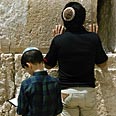
Torah portion: Ha’azinu
On Shabbat Shuva, with Yom Kippur approaching, it is fitting that we focus upon this thought: Human life is a supreme value
The poem of Ha’azinu describes times in which God proclaims: “I will hide my countenance from them” (Deut. 32:20). But then Moses provides us with the tools to cope with the hiding of God’s countenance, and for finding a guiding path:
"He said to them: Take to heart all the words with which I have warned you this day. Enjoin them upon your children, that they may observe faithfully all the terms of this teaching. For this is not a trifling thing for you: it is your very life; through it you shall long endure on the land that you are to possess upon crossing the Jordan." (Deut. 32:46-47).
What is the meaning of 'a trifling thing for you?'
In Midrash Tana’im (see Genesis Rabba 53, Jer. Talmud Pe’ah 1:1, and other parallels) we are told: “For this is not a trifling thing for you, and if it is trifling, it is because you have not scrutinized it and sufficiently reflected upon its meaning.”
It is our duty to study the sources and our heritage in depth, as the parasha says (v. 7): “Ask your father, he will inform you, your elders, they will tell you,” and to try to find the answer. This is vital to our continued physical and spiritual existence – “it is your very life.”
In addressing the verses on the mitzvah of tzitzit (Numbers 15:39-40), our Sages explained:
“Look” and “recall”: Seeing causes us to remember, and remembering leads to action, for its says, “Thus you shall be reminded to observe all My commandments.”
This is likened to a person who has fallen into the water. The captain throws him a rope. He says, “Grab the rope and do not let go, for if you let go you will not live.” Here, too, God says to Israel: As long as you hold fast to the mitzvoth, it is said of you “while you, who held fast to the Lord your God, are all alive today” (Deut. 4:4).
There's no unequivocal answer
The way to cope with the frustration, the pain and the sense of loss (in addition to social action, which is also an imperative of Jewish ethics) is to “grab the rope” – to study and to act, so that through our study and our deeds we will be mindful of our purpose and understand what we must do.
Although there are no unequivocal answers to all the questions that we face, there can be no doubt that the sanctity of life is a supreme value. The classical source for this is the Mishna Sanhedrin (4:5):
Therefore man was created singly, to teach you that whoever destroys a single soul of Israel, Scripture accounts it as if he had destroyed a whole world; and whoever saves one soul of Israel, Scripture accounts it as if he had saved a whole world.
Of course, the words “of Israel” do not appear in the manuscripts (after all, Adam was not “of Israel”), inasmuch as this mishna conveys a universal message:
The life of any person is equivalent to a “whole world.” Even when lives are unavoidably lost in war, we must guard against the complacency of “So Jeshurun grew fat and kicked — You grew fat and gross and coarse — He forsook the God who made him and spurned the Rock of his support,” lest we act without restraint.
On Shabbat Shuva, with Yom Kippur approaching, it is fitting that we focus upon this thought: Human life is a supreme value. Each of us can infuse that life with the substance that our “father and elders” - our heritage – teach us, as long as this value is maintained.
Our tradition is a rescue line that helps us to overcome difficult times. We, too, must study our traditions and fulfil its imperatives as a constant reminder of our purpose, and in the hope that the days of the hiding of God’s countenance will come to an end.
Torah roundtable / Rabbi Dr. Alexander Even-Chen
One of the central themes of Rosh Hashana and Yom Kippur is repentance. In addressing this subject, Rabbi Soloveitchik wrote:
"Repentance is a creative act through which man creates himself. In the external, physical world, man cannot be a creator but can only discover some of nature’s laws and elucidate them in the technical sense – “fill the world and subdue it” (Genesis 1:28). As opposed to this, in his personal, internal world, man can be the creator of worlds.
"The secret lies in the creation of man himself. All other creatures are born almost perfect. While at first they are helpless, within a few days of their birth they are perfected through their own efforts. Not so for man. His physical development is slower, and the newborn is entirely dependant upon its parents.
"And as far as its spiritual development is concerned, it is born with character traits and potential talent that it must develop over the course of many years, through a lengthy process, until it defines its spiritual character…
"On Rosh Hashanah, man must examine whether he may, Heaven forbid, have desecrated the Divine image… On Yom Kippur, man must be a creator, and with the help of God, recreate and redefine his Divine image."
- Can a person repent?
- What does Rabbi Soloveitchik mean when he says that man can create himself?
- Are we sufficiently free to change our direction?
- Are we not familiar with situations that lead us to thoughts and conduct that we know we will regret? If that is the case, why don’t we stop?
- Is it true that “in his personal, internal world, man can be the creator of worlds”?
Courtesy of Schechter Rabbinical Seminary in the Schechter Institute of Jewish Studies










